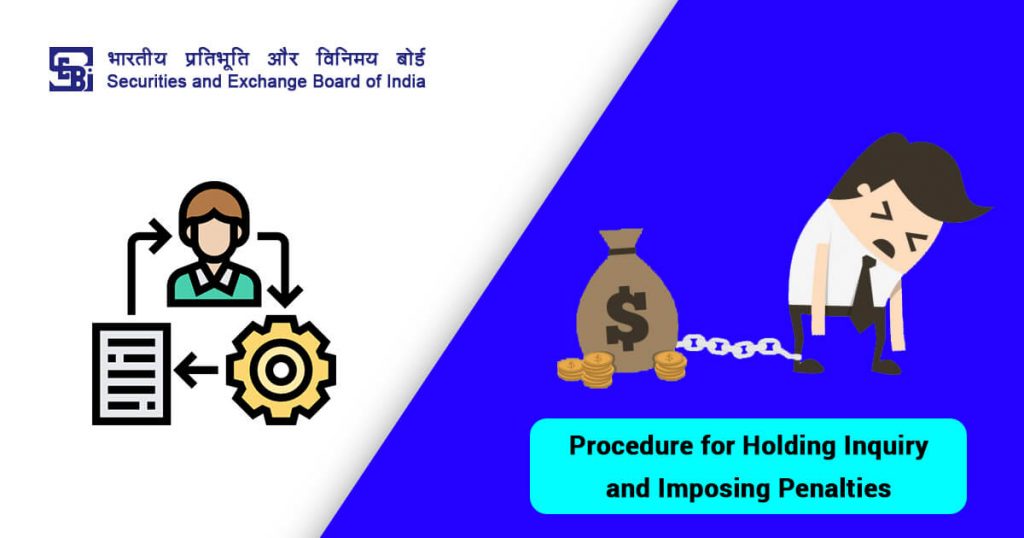Procedure for Holding Inquiry and Imposing Penalties by SEBI

Khushboo Priya | Updated: Aug 22, 2019 | Category: SEBI Advisory
If at any point, SEBI, which is also known as the Securities and Exchange Board of India, doubts any of the listed company has committed contraventions or discrepancy or default, the board can opt for holding inquiry and imposing penalties on the respective company.
The SEBI will appoint an adjudicating officer to carry out the process further. In this blog, we have described the procedure for holding an inquiry for the purpose of imposing a penalty.
Table of Contents
When does holding inquiry and imposing penalties by SEBI take place?
The SEBI orders to hold an inquiry and impose a penalty in case the company or any person is guilty of any discrepancy, fraudulent, committed contravention, etc. as specified under section 15A, 15B, 15C, 15D, 15E, 15F, 15G 2, [15HA and 15HB] of the SEBI Act.
Browse through our articles on services provided at Swarit Advisors, and just let us know if we can help you with your IPO or Comapny Takeover or SEBI Advisory Services.
What’s the procedure for holding inquiry and imposing penalties?
Any entity that has violated securities laws or has provided any wrong information related to the business, the SEBI will hold an inquiry and impose a penalty on it.
The procedure for holding an inquiry and imposing penalties is as follows:
Appointment of adjudicating officer for holding an inquiry
If SEBI feels that there’s a ground for adjudging under any of the provisions of Chapter VI-A of the SEBI Act, the board will appoint an adjudicating officer with the rank not below than the Division Chief for holding an inquiry for the same.
Sending a notice to the person for the show cause
If the person is found to have committed contraventions as prescribed in any of Sections 15A, 15B, 15C, 15D, 15E, 15F, 15G 2, [15HA and 15HB], the officer shall issue a notice to the person to show cause within the period as specified in the notice.
Usually, the period is not less than fourteen days from the date of service. The concerned person needs to specify why the inquiry must not be held against him. Furthermore, any notice under sub-rule (1) to any such indicates the nature of the offense that the person has committed.
Notice for the appearance
Next, the officer will consider the cause and has an option for holding an inquiry against the person. For the same, he will issue a notice which includes a date for the appearance of that person.
The person can choose to appear either through his lawyer or personal or other authorized representative.
On the appearance of the person, the officer will explain the offense that the person has committed and that it indicates the provisions of the concerned Act, Rules or Regulations in respect of which contravention took place.
Documents submission by the person as proof
Next, the adjudicating officer shall then offer an opportunity to the person for producing relevant documents, related to the inquiry, as evidence. If necessary, the officer may adjourn the hearing to a future date. Furthermore, in accepting such evidence, the officer must not be bound to consider the provisions of the Evidence Act, 1872 (11 of 1872):
- That the notice/person referring to in sub-rule (3), (4), and (5) may be waived at the request of the concerned person.
Moreover, the Board may appoint an officer namely- presenting an officer in an inquiry under such rule.
Order of adjudicating officer for imposing penalties
If, after the submission of evidence, the adjudicating officer is contented that the person is liable to penalty under any of the sections indicated in sub-section (1) of section 15-I, he may, in writing, impose penalties according to the provisions of the pertinent section/sections as given in section 15-I.
At the time of adjudging the quantum of penalty, the officer shall have, under section 15-I, due regard to the factors as follows:
- The amount of unfair advantage or disproportionate gain, wherever quantifiable, made as a result of the default;
- The amount that an investor or a group of investors has lost as a result of the default;
- The recurring nature of the default.
All orders under sub-rule (1) shall lay down the provisions of the SEBI Act in respect of which default took place. Moreover, it must contain brief reasons justifying such decisions.
Furthermore, the adjudicating officer shall sign and mention the date on every such order.
Submission of order to SEBI
Next, a copy of the all the orders made under SEBI rules shall be sent by the adjudicating officer to the SEBI.
Sending order to the concerned person
Furthermore, the officer shall send a notice or order issued under such rules to the concerned person. Moreover, the adjudicating officer shall serve the order on the person in the following way, that is to say,-
- Through tendering or delivering it to the person or his duly authorized agent;
- By sending it to the person through (electronic mail or fax or speed post or courier along with acknowledgment due or) registered post with acknowledgement due to the address of the person’s residential place or his last known residential place or the location where he carries on, or last carried on, personally or business works or last worked, for gain.
Note: The notice sent though Fax shall endure a note that the same is via fax. Additionally, in case the document consists of annexure, the officer shall also mention the number of pages being sent.Furthermore, a notice sent through electronic mail must contain the digital signature of the competent authority. Besides, the bouncing of the email shall not constitute a valid service.
The rule applicable is referred to as the “Securities and Exchange Board of India (Procedure for Holding Inquiry and Imposing Penalties by Adjudicating Officer) Rules, 1995.”














